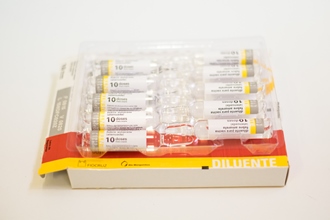 The Pan American Health Organization / World Health Organization (PAHO / WHO) estimates that the most important measure to prevent yellow fever is immunization. People who live or move to areas at risk should have their vaccines up to date and protect themselves from mosquito bites. Only one dose of the vaccine is sufficient to provide immunity and protection throughout life. Severe side effects are extremely rare.
The Pan American Health Organization / World Health Organization (PAHO / WHO) estimates that the most important measure to prevent yellow fever is immunization. People who live or move to areas at risk should have their vaccines up to date and protect themselves from mosquito bites. Only one dose of the vaccine is sufficient to provide immunity and protection throughout life. Severe side effects are extremely rare.
Travelers with contraindications to the yellow fever vaccine (children under 9 months of age, pregnant or lactating women, persons with severe hypersensitivity to egg protein and severe immunodeficiency) or older than 60 years should consult their health care provider for risk-benefit careful evaluation.
The WHO also recommends looking for health care in case of yellow fever symptoms and signs, during travel and after returning from areas with risk of transmission of the disease.
See more information at PAHO/WHO Brazil
Yellow fever is an acute febrile infectious disease, caused by arthropod vector-borne virus that has two epidemiological different transmission cycles: wild and urban. It is considered of major epidemiological importance due to its clinical severity and high dissemination potential in urban areas infested by Aedes aegypti.
Yellow Fever
Primary Health Care (PHC) – Formative second opinion
Outbreak of Yellow Fever
Yellow Fever in the context of Brazil
Prevention and treatment
Transmission of Yellow Fever
Clinical symptoms and diagnosis
![]() A global strategy to Eliminate Yellow fever Epidemics 2017–2026
A global strategy to Eliminate Yellow fever Epidemics 2017–2026
Ministry of Health Brazil(web portal) (in portuguese)
Epidemiological alerts and updates – PAHO/WHO
Hoja informativa – PAHO/WHO (in spanish)
Oswaldo Cruz Foundation – Fiocruz (in portuguese)
World Health Organization (WHO)